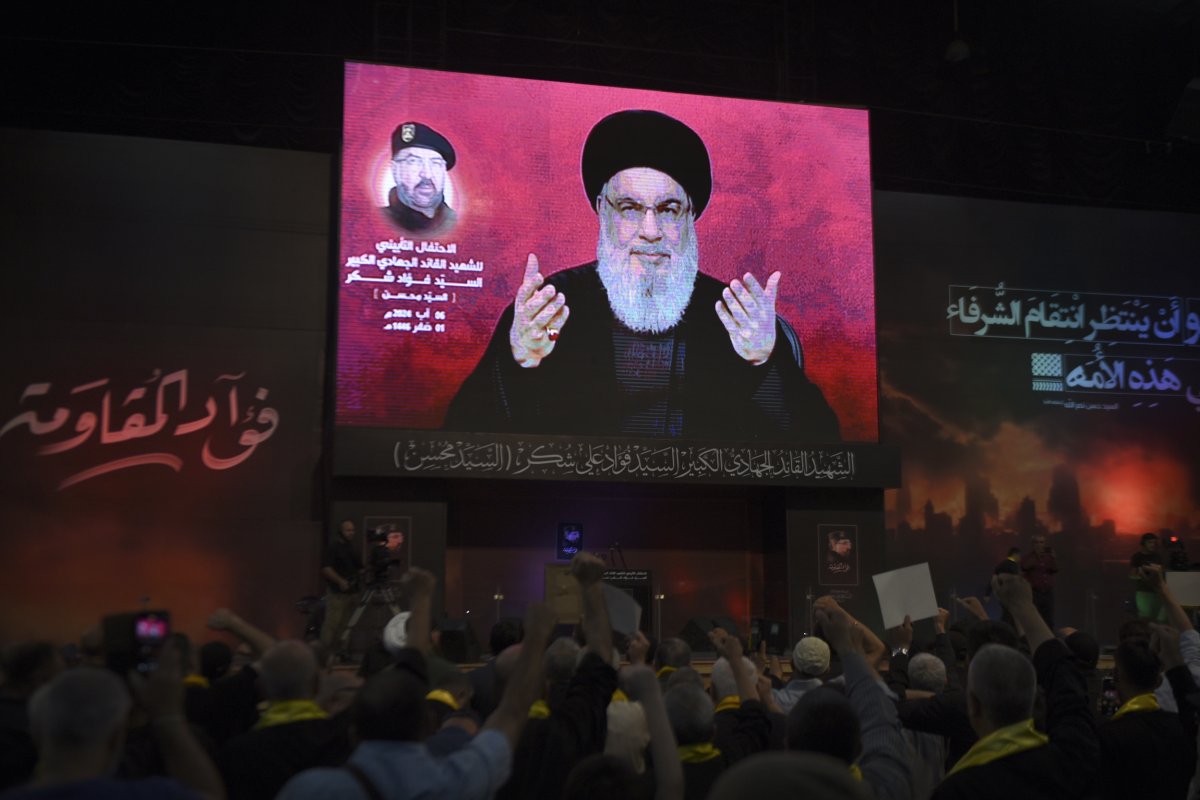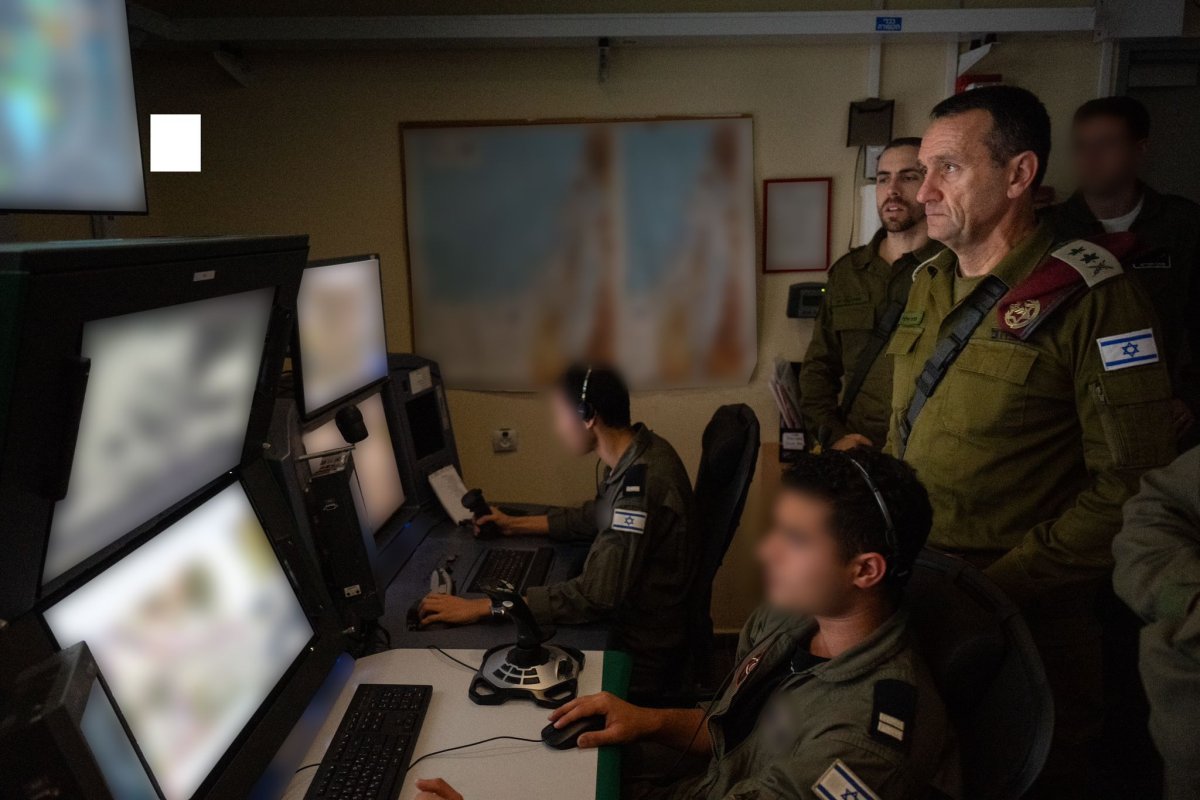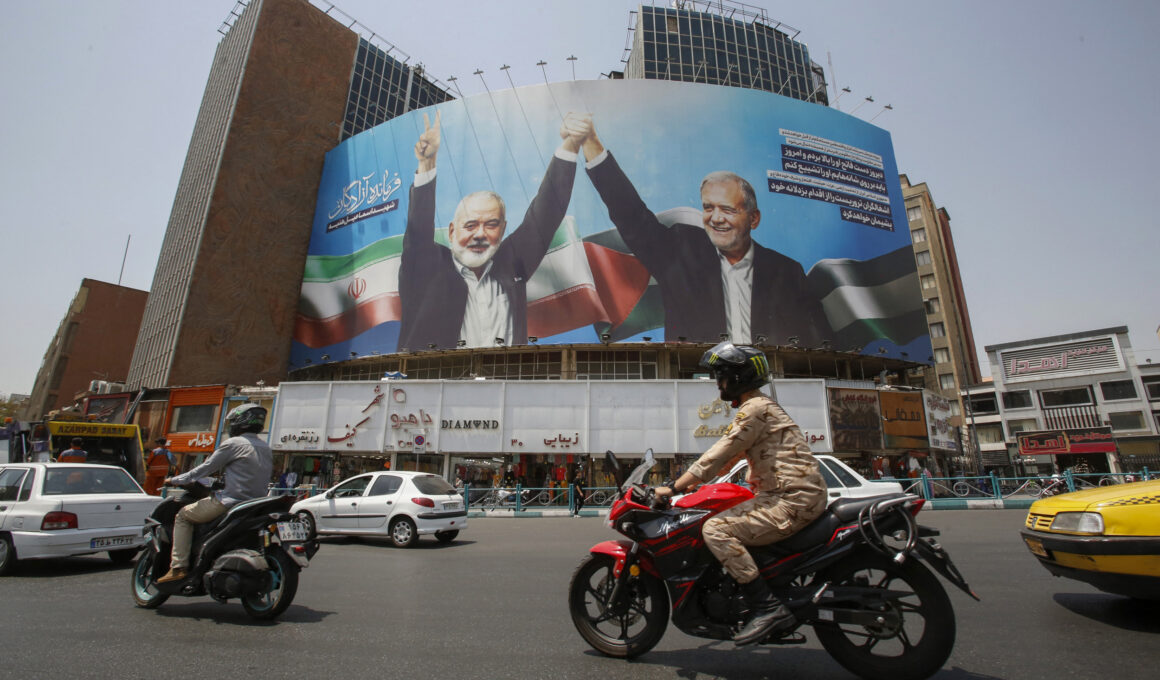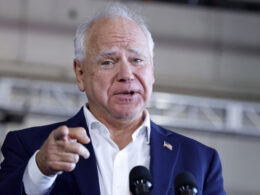As Iran continues to weigh its options to retaliate for the killing of Hamas political chief Ismail Haniyeh late last month in Tehran, an intense debate has emerged within the highest circles of the Islamic Republic as to how to strike back at Israel without further inflaming the regional crisis surrounding the ongoing war in the Gaza Strip.
A major escalation is not inevitable, however.
With U.S. President Joe Biden‘s administration now scrambling alongside mediators Egypt and Qatar to push both Israeli Prime Minister Benjamin Netanyahu and newly ascended Hamas leader Yahya Sinwar toward achieving a breakthrough on long-deadlocked ceasefire talks, a glimmer of hope exists for a rare moment of restraint in a region otherwise consumed by conflict.
But whether such an agreement is possible or would go far enough to satisfy Tehran and its allies’ appetite for revenge remains an ominous variable that looms over the Middle East.
“The assassination of Haniyeh in Tehran has led Iran’s military decision-makers to the conclusion that in order to restrain Israel’s actions, they must design and implement a more decisive, painful and strategic response compared to the Sadegh operation,” Iranian researcher Mostafa Najafi told Newsweek, referencing the unprecedented Iranian missile and drone strike against Israel in April over the killing of Iranian military personnel in Syria.
“However, Iran’s priority is still ending the war in Gaza and reducing the suffering of its people,” Najafi, who specializes in Middle East conflicts and Iran’s foreign policy, said. “For this reason, Iran’s response to the Israeli regime is certain unless the United States, as the main supporter of Tel Aviv, puts a new incentive on the table and satisfies Iran.”
A Test for Tehran and Washington
In a statement shared with Newsweek on Friday, the Iranian Mission to the United Nations conveyed that Iran’s prevailing objective was to end the war in Gaza and affirmed that, while ensuring Israel answered for Haniyeh’s death was within Tehran’s right, such an action should not disrupt efforts toward a ceasefire.
“Our priority is to establish a lasting ceasefire in Gaza; any agreement accepted by Hamas will also be recognized by us,” the Iranian Mission said. “The Israeli regime has violated our national security and sovereignty through its recent act of terrorism. We have the legitimate right to self-defense—a matter totally unrelated to the Gaza ceasefire.”
“However,” the Iranian Mission added, “we hope that our response will be timed and conducted in a manner not to the detriment of the potential ceasefire.”
The statement also confirmed the existence of communications between Tehran and Washington, though it did not go into further detail about the content of these discussions.
“Direct and intermediary official channels to exchange messages have always existed between Iran and the United States,” the Iranian Mission said, “the details of which both parties prefer to remain untold.”
Earlier that same day, White House National Security Council Communications Adviser John Kirby told reporters on a press call that Biden “is 100 precent committed to helping defend Israel, and we have put military capabilities in the region of a sufficient quantity and quality to do just that.”
“But we’re also working at the same time in the diplomatic space to try to de-escalate the tensions and to prevent any major escalation of the conflict there in the region,” he added, “and certainly to prevent any all-out war.”
The situation is further complicated by the deep level of mistrust that exists among the parties and stakeholders of the conflict. Since Biden first unveiled his three-phase road map for a cessation of hostilities, prisoner swap and withdrawal of Israeli forces from Gaza in late May, U.S. officials have portrayed the subsequent talks as being on the verge of a breakthrough, even in the absence of visible progress.
Representatives of both Hamas and Israel have also offered diverging descriptions of the contents of the deal and have yet to publicly relent on their respective positions despite the mounting pressure. Meanwhile, the clock ticks for Biden as well, with an election looming in less than three months, one in which his deputy, Vice President Kamala Harris, is set to face a tough contest against former President Donald Trump.
Amid these uncertainties, Najafi argued that neither simply holding a new round of Gaza ceasefire talks, scheduled to begin next Thursday, or rekindling a separate frozen negotiation process on the embattled Joint Comprehensive Plan of Action (JCPOA) nuclear deal would be enough to “satisfy Iran’s demands due to Iran’s pessimism about America’s intentions.”
“Rather, assuring Iran of an immediate ceasefire within the next few days can prevent a large-scale Iranian attack on Israel,” Najafi said. “Proposals such as the start of nuclear negotiations will not be a stimulus to prevent Israel from responding. This was an offer that America made to Iran, but it was rejected by Tehran.”
The deliberations also come at a turbulent time for the Islamic Republic, in which a recent shift in political tides has given rise to new risks and opportunities.
Haniyeh’s death, for which Israel has neither confirmed nor denied its involvement, came just hours after he attended the swearing in ceremony of newly elected Iranian President Masoud Pezeshkian. The reformist leader won a historically tight race this summer in the wake of the sudden death of late principalist conservative President Ebrahim Raisi in a helicopter crash in May.
Pezeshkian’s victory has been viewed within Iran as a chance for the country to embark on a new direction after years of hard-liners consolidating power and a deterioration of ties with the West, particularly after the U.S. unilaterally abandoned the hard-won JCPOA under Trump in 2018. Still, ultimate authority rests with Supreme Leader Ayatollah Ali Khamenei.
The crisis today marks an early, decisive test for how Pezeshkian will work with Khamenei and other influential entities, including the Supreme National Security Council and the Islamic Revolutionary Guard Corps (IRGC).
Najafi identified two primary views within Iran, where “some say that a direct and deterrent response should be given to Israel, and others believe that it is necessary to step more cautiously to curb Netanyahu’s belligerent approaches.” He also spoke, however, of a broad consensus within Iran’s leadership, including Pezeshkian, that “an appropriate response” must be delivered to Israel over Haniyeh’s killing in one form or another.
Saeed Azimi, a political journalist and commentator in Tehran, echoed this view in asserting that “Pezeshkian’s administration will not back down from responding to Israel,” though he said the new president may seek to calm the flaring tempers in the region.
“As the Chairman of the Supreme National Security Council, it is Pezeshkian who brings to the Supreme Leader the options approved in that council,” Azimi told Newsweek. “But I’m convinced that his administration, though it has not been formed yet, is trying hard to de-escalate the tensions.”

Coordinating With the Axis
But yet another unknown factor is the calculus of Iran’s informal coalition of allies known as the Axis of Resistance, at the forefront of which is the Lebanese Hezbollah movement.
Less than a day before Haniyeh’s death and amid worsening clashes along the Israel-Lebanon border that threaten to open a new theater in the Israel-Hamas war that began last October, the Israel Defense Forces (IDF) conducted an airstrike killing top Hezbollah military official Fouad Shukr in Beirut. The IDF said Shukr was killed due to his alleged role in a deadly rocket attack against the town of Majdal Shams in the Israel-occupied Golan Heights, though Hezbollah has denied involvement in the attack.
Reached for comment on Hezbollah’s plans to respond, a spokesperson for the group referred Newsweek to the latest words of Secretary-General Hassan Nasrallah, who vowed on Tuesday that “our response is certainly coming and will be strong, impactful and effective.”
“I’m convinced that Hezbollah will act without giving a prior warning to Iran. Hezbollah’s motivations are personal,” Azimi said. “It’s not just Haniyeh. Losing Fouad Shukur was a big blow to Hassan Nasrallah, and he will have to give some sort of response.”
“I’m hoping for the best,” Azimi added. “I’m hoping Tehran could manage to control the Axis altogether.”
It’s not just Hezbollah, either. Nasrallah also hinted during his latest speech at the possibility of a coordinated strike or series of strikes from the entirety of the multinational Axis of Resistance.
Representatives of fellow Axis of Resistance groups Ansar Allah of Yemen and the Islamic Resistance in Iraq have also recently discussed with Newsweek their potential to take further actions against Israel as well as the U.S., which has conducted strikes on both factions.
Throughout the war in Gaza, Iranian officials have touted their cooperation with Axis of Resistance allies as the militias have launched daily operations against Israel, while asserting that Tehran does not exert total control over these groups. Still, many observers both within Iran and abroad feel that, if Iran does strike Israel, it would do so in tandem with its allies, who may ultimately lead the first of multiple charges.
“It is possible that Iran would eventually choose to lead from behind, allowing Hezbollah to escalate against Israel at an opportune moment, when Israel has brought down its guard and the U.S. is distracted elsewhere,” Ali Vaez, a former U.N. Political and Peacebuilding Affairs Department senior political officer now serving as director of the Crisis Group’s Iran Project, told Newsweek.
“Depending on how Israel would respond to such an attack, Iran could calibrate the degree of its own involvement,” Vaez said. “It is also quite possible that Iran would pursue soft targets, in order to respond in kind to what it saw as an act of terrorism on its soil.”

A Cycle of Revenge
The Israeli response factors large in Iran’s thinking. Still reeling over Raisi’s fatal crash, the cause of which was officially ruled to be due to inclement weather, the nation’s security has again been called into question over the brazen assassination of Haniyeh in a secure compound used by the IRGC.
Israel has a long history of conducting rarely claimed acts of sabotage and assassinations within the Islamic Republic, often targeting sites and individuals associated with the country’s nuclear program. While Iran possesses a vast arsenal of far-reaching conventional weapons and a much larger military, Israel boasts an array of advanced platforms it uses to strike targets across the region.
Unlike Iran, Israel is also widely believed to possess nuclear weapons.
In the wake of the large-scale missile and drone attack conducted by Iran against Israel in April, Israel reportedly conducted a retaliatory airstrike at an air base in the Iranian city of Isfahan, though both nations downplayed the incident. Now, however, if Iran opts for another, potentially even bigger strike against Israel, the consequences could be harsher—and possibly play into Israel’s hands.
“Iran and its allies see the trap that Netanyahu has laid in front of them,” Vaez said. “They don’t want to give him justification to expand the war and extend his political lifeline.”
“Defeating Netanyahu seems to be as important of a strategic objective for them as revenge, which they know is a dish best served cold,” he added. “A ceasefire deal gives Iran a face-saving way out of the need to take immediate action, while weakening Netanyahu’s position at home.”
The result for now is a tense waiting game that has left a region already burdened by turmoil once again on edge amid high-stakes discussions now taking place among key players.
“I believe the primary cause of the delay is the complex consultations and decision-making process in Beirut and Tehran,” Raz Zimmt, a former IDF intelligence official now senior researcher at the Institute for National Security Studies in Tel Aviv, told Newsweek.
“This process aims to provide the best possible response to the assassinations of Shukr and Haniyeh while minimizing the risk of an all-out war with Israel—something neither party is interested in, despite Hezbollah’s and Iran’s willingness to take risks,” Zimmt said. “The need to coordinate the positions of Iran, Hezbollah, and other Iranian proxies may also cause a delay in the response.”
And he, too, believed that the “internal debate within Iran’s leadership, especially following the election of Pezeshkian, may have made decision-making even harder.”
As for the potential for such an attack to set off a series of events that could lead to an even wider war in the region, Zimmt argued that “the risk of escalation into a military conflict could be mitigated to some extent if Hezbollah or Iran responds with a restricted number of military targets, notably in northern Israel.”
“However,” he added, “any retaliation, particularly against targets in central Israel or near civilian neighborhoods, may result in an undesired clash.”
An IDF official recently told Newsweek that an attack on Israeli civilians would be considered a “wider escalation,” something the official said Israel hoped to avoid, but for which it was “in full readiness.” The IDF official also said Israel was taking the threats being issued by Iran, Hezbollah and their allies “very seriously” and felt that “for sure” Hezbollah would strike back over Shukr’s killing.
Zimmt also said he believed “Hezbollah will respond regardless of whether a deal is reached in Gaza,” something he felt “is very doubtful in the next few days.”
“However,” he added, “if there is significant progress in the talks in the coming days, that may change the character of the response and limit it.”








